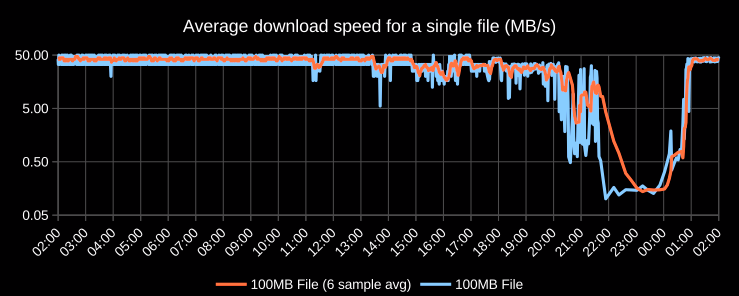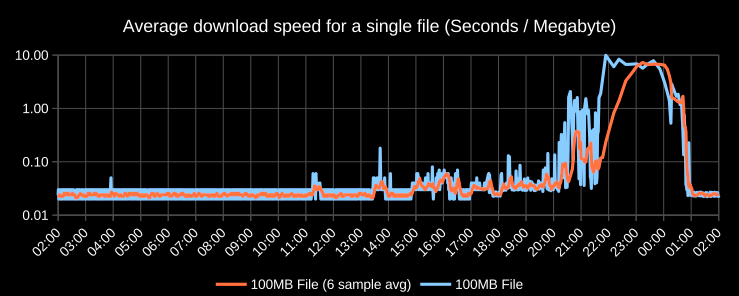Why does a 50MB/s ISP service run at 0.5MB/s?
My ISP claims to give me a symmetric 500Mb/s connection (50MB/s effectively) but, when starting any significant download, the download speed halts to a crawl.
I would expect my downloads to be in the vicinity of 50MB/s or at the very least somewhere in the middle of that. Let’s be generous and say 10MB/s. So, what is the average speed I’m getting?
320kB/s
Yes, not even a miserable megabyte. After seeing this, the only reasonable thing to do is check if it is just that the servers I’m downloading from just suck, so I decided to check how different is downloading the exact same file from different servers all across the world, and my test subject will be the current Debian net inst ISO, which is available in 43 countries all over the world. I will be picking most of Europe and some other far away countries for this test.
The file will be downloaded with Axel, a download accelerator that uses multiple connections that might bypass any throttling to TCP traffic that my ISP could be doing, the number of concurrent connections between (parentheses) on the table below.
The speed listed here is whatever the application says it is at the 2 minute mark, I’m guessing it is the average speed since it keeps going down to a limit ever so slowly as time goes on.
Without further ado, here there are some measured speeds, in the order I did the tests:
| CC | Host | (1) | (5) | (10) |
|---|---|---|---|---|
| 🇦🇷 AR | debian.xfree.com.ar | 0.05 MB/s | 0.30 MB/s | 0.64 MB/s |
| 🇦🇲 AM | mirrors.asnet.am | 0.17 MB/s | 0.77 MB/s | 1.80 MB/s |
| 🇦🇹 AT | debian.anexia.at | 0.39 MB/s | 1.90 MB/s | 5.73 MB/s |
| 🇧🇾 BY | ftp.byfly.by | 0.40 MB/s | 1.90 MB/s | 1.30 MB/s |
| 🇧🇪 BE | mirror.as35701.net | 0.42 MB/s | 2.10 MB/s | 4.40 MB/s |
| 🇭🇷 HR | debian.carnet.hr | 10.60 MB/s | 8.50 MB/s | 8.46 MB/s |
| 🇨🇿 CZ | mirror.dkm.cz | 26.50 MB/s | 74.92 MB/s | 86.56 MB/s |
| 🇩🇰 DK | mirror.one.com | 3.26 MB/s | 15.98 MB/s | 13.47 MB/s |
| 🇫🇷 FR | ftp.crifo.org | 62.71 MB/s | 55.72 MB/s | 43.87 MB/s |
| 🇩🇪 DE | ftp.uni-hannover.de | 5.77 MB/s | 17.69 MB/s | 15.00 MB/s |
| 🇭🇺 HU | ftp.bme.hu | 4.67 MB/s | 17.69 MB/s | 58.86 MB/s |
| 🇱🇻 LV | debian.koyanet.lv | 38.04 MB/s | 70.58 MB/s | 66.82 MB/s |
| 🇱🇹 LT | debian.mirror.vu.lt | 38.09 MB/s | 33.73 MB/s | 38.45 MB/s |
| 🇳🇱 NL | mirror.nl.datapacket.com | 67.30 MB/s | 11.99 MB/s | 18.88 MB/s |
| 🇳🇴 NO | ftp.uio.no | 38.97 MB/s | 56.21 MB/s | 66.79 MB/s |
At this point I start to notice downloads are FAST and that the clock
reads 01:11 so I repeat one of the early tests, the one against Belgium
or the one from Armenia, and try to test if it is just congestion on the net.
| CC | Host | (1) | (5) | (10) |
|---|---|---|---|---|
| 🇧🇪 BE | mirror.as35701.net | 25.50 MB/s | 17.48 MB/s | 20.85 MB/s |
| 🇦🇲 AM | mirrors.asnet.am | 18.56 MB/s | 5.07 MB/s |
Yeah… Significantly faster. And more connections started being a hurdle rather than an advantage. It looks like my ISP is just overselling capacity and that during the night, the connection speed resembles the purchased speed.
That would mean that during the day, download speed should vary wildly against a known server. Let’s see how it goes by checking against a file hosted on this very server.
So let’s create an un compressible 100MB file, host it and have a script download it repeatedly during one day every other minute. How bad could the results be?
Bad. Logarithmic scale bad:

From Megabytes per second to seconds per Megabyte.
The complete dataset is here but TL;DR: From 22:00 to 01:00 do not
even bother to attempt Netflix & Chill, it will not even load in ultra low SD
resolutions.
Working theory on my head is the ISP is either overselling capacity HARD to its clients, or that “something” is happening just as everyone is at home trying to watch the latest movies. Yeah, they are overselling like crazy.
2024/12/30: I made a chart with seconds per megabyte instead of megabytes per second since it really drives the point home pn how SLOW it was at that point.
 Up to 10 seconds per megabyte, on average, at certain datapoints.
Up to 10 seconds per megabyte, on average, at certain datapoints.